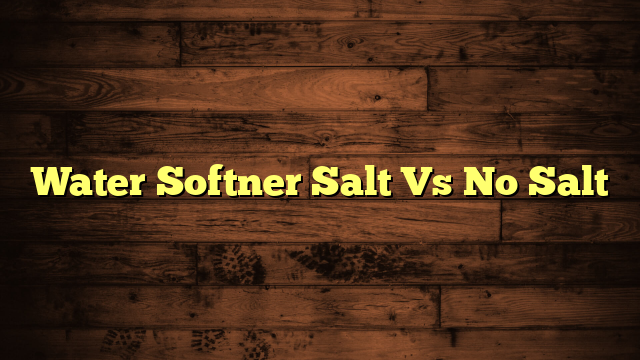Water Softner Salt Vs No Salt
Isn't it fascinating how something as simple as water can spark such a debate? When you're faced with the choice between water softener salt and no-salt alternatives, it can feel overwhelming. Each option presents distinct benefits and drawbacks, from maintenance costs to environmental impact. You might find yourself weighing the effectiveness of traditional softeners against the lower maintenance of no-salt systems. What might these trade-offs mean for your home and health? Understanding the nuances could lead you to a decision that aligns with your priorities.
Key Takeaways
- Water softener salt effectively removes hardness minerals, improving water clarity and appliance efficiency.
- No-salt systems condition water without removing minerals, reducing scale buildup while maintaining mineral content.
- Salt-based systems require regular maintenance and ongoing costs for salt purchases, while no-salt systems generally have lower maintenance needs.
- Environmental concerns arise from salt runoff in water systems, whereas no-salt options are more eco-friendly.
- No-salt solutions may have limited effectiveness in addressing hard water issues compared to traditional salt systems.
Understanding Hard Water
Understanding hard water is essential, especially if you want to maintain your home's plumbing and appliances. Hard water contains high levels of minerals, primarily calcium and magnesium. This water hardness can lead to several issues, including calcium buildup in your pipes, faucets, and appliances.
Over time, this buildup reduces water flow and efficiency, which can cost you money in repairs or replacements.
You might already be noticing signs of hard water in your home. Have you seen cloudy spots on your dishes or a film on your showerhead? These are clear indicators of mineral deposits from hard water.
If left untreated, calcium buildup can also affect your water heater, leading to increased energy bills and reduced lifespan.
To avoid these problems, it's vital to understand your water hardness. You can easily test your water at home with a simple kit, or you might check with your local water authority.
Knowing the hardness level will help you decide if you need a water softener or other solutions to mitigate the effects.
Ultimately, staying informed about hard water helps you protect your home and appliances, ensuring they function effectively for years to come.
Benefits of Water Softener Salt
Using water softener salt can greatly improve your water quality, making it gentler on your skin and hair.
You'll also notice that your appliances last longer because they won't be battling the damaging effects of hard water buildup.
Improved Water Quality
Water softener salt considerably enhances the quality of your water, making it more suitable for everyday use. One of the main benefits you'll notice is improved water clarity. When minerals like calcium and magnesium are removed, your water becomes clearer and free from cloudiness. This clarity not only looks appealing but also guarantees that your drinking water is more inviting.
Moreover, taste enhancement is another significant advantage. Softened water has a smoother, more pleasant taste, which can make drinking water more enjoyable. You might find that your coffee, tea, and even cooking are elevated in flavor because of the improved water quality.
Here's a quick comparison of the benefits:
| Benefit | Water Softener Salt | No Salt |
|---|---|---|
| Water Clarity | High | Low |
| Taste Enhancement | Significant | Minimal |
Appliance Longevity Benefits
Many homeowners overlook the impact of softened water on their appliances, but it can greatly extend their lifespan. When you use water softener salt, you're not just improving your water quality; you're also protecting your valuable appliances.
Hard water can lead to scale buildup in your dishwasher, washing machine, and water heater, which can cause them to work harder and wear out faster. By switching to softened water, you can considerably reduce this buildup.
With fewer mineral deposits to contend with, your appliances will run more efficiently, which means they won't need repairs as often. This not only enhances appliance lifespan but also cuts down on maintenance costs, saving you money in the long run.
You'll find that your appliances can operate at peak performance for years longer if they're not constantly battling the effects of hard water.
Incorporating water softener salt into your home's water system is a simple yet effective way to guarantee that your appliances remain in top shape, ultimately giving you peace of mind and a healthier home environment.
Drawbacks of Water Softener Salt
While water softener salt can improve your water quality, it does come with some drawbacks you should consider.
The environmental impact of salt runoff can be significant, and you'll also face ongoing maintenance requirements to keep the system running smoothly.
Both of these factors can influence your decision, so it's important to weigh them against the benefits.
Environmental Impact Concerns
Using water softener salt can have significant environmental impacts that often go overlooked. One major concern is salt runoff, which occurs when excess salt from your water softener washes into local waterways. This runoff can lead to elevated salinity levels in rivers and lakes, harming aquatic life and disrupting ecosystems.
You mightn't realize it, but this salt can also contaminate drinking water supplies, posing risks to your health and that of your community.
Additionally, the production and transportation of water softener salt contribute to a larger carbon footprint, raising questions about environmental sustainability. The mining of salt has its own set of ecological consequences, including habitat destruction and increased pollution.
By relying on salt-based water softeners, you may inadvertently support practices that are detrimental to the environment.
As you consider your options for water softening, it's crucial to weigh these environmental impacts. Exploring alternatives, such as salt-free systems, mightn't only benefit your water quality but also promote a healthier planet.
Making informed choices can lead to a positive change, ensuring you protect both your home and the environment for future generations.
Ongoing Maintenance Requirements
Maintaining a water softener that relies on salt demands regular attention and can become a hassle over time. You'll need to monitor salt levels consistently, ensuring the brine tank is filled to avoid system interruptions.
If the salt runs low, your water quality can suffer, leading to potential scaling and mineral buildup in your pipes and appliances.
Beyond simple refills, regular maintenance also includes cleaning the brine tank and ensuring the system is functioning correctly. You might find yourself spending extra time checking for clogs or salt bridges, which can disrupt the entire softening process.
This ongoing upkeep can be tedious, especially when life gets busy.
Additionally, you'll need to evaluate the costs associated with purchasing salt regularly, which can add up over time. If you're not diligent about system upkeep, you could face costly repairs or replacements down the line.
In contrast, no-salt systems require much less attention and upkeep, making them a more convenient option for many homeowners.
Ultimately, if you prefer a hassle-free solution, assessing the ongoing maintenance requirements of salt-based systems against no-salt alternatives is essential.
Overview of No-Salt Systems
No-salt systems offer an alternative approach to water treatment, catering to those who want to reduce hardness without relying on traditional salt-based softeners.
These innovative solutions utilize no salt technology, which works by conditioning the water rather than removing the hardness-causing minerals. Fundamentally, they change the structure of the minerals, making them less likely to form scale deposits in your plumbing and appliances.
You might find that no-salt systems come in various forms, such as template-assisted crystallization or electromagnetic devices. Each of these methods has its own unique way of altering the mineral composition in your water.
Unlike conventional softeners, they don't require regular salt replenishment, making them a more convenient option for many households.
As you consider water conditioning options, it's crucial to understand that while these systems don't technically soften water, they do help mitigate some of the negative effects of hard water.
This can lead to improved efficiency for your appliances and plumbing, ultimately saving you money in the long run.
Advantages of No-Salt Alternatives
Choosing no-salt alternatives comes with several advantages that can enhance your water treatment experience.
First and foremost, these systems are often more cost-effective in the long run. You won't have to buy salt regularly, which can add up over time. Instead, you can invest in a no-salt system that requires minimal maintenance and has lower operational costs.
Moreover, no-salt alternatives offer significant health benefits. Traditional salt-based water softeners can lead to higher sodium levels in your drinking water, which isn't ideal for everyone, especially those on sodium-restricted diets. By opting for a no-salt solution, you can guarantee your water remains healthier and more suitable for all family members.
In addition, these systems can help preserve the natural minerals found in your water, providing a more balanced taste. You'll notice that your water feels softer without the harsh chemicals that sometimes accompany salt-based treatments.
Limitations of No-Salt Solutions
While no-salt solutions offer certain benefits, they do come with some limitations that you should consider. First and foremost, you might find that their cost effectiveness isn't always as strong as traditional salt-based systems.
While no-salt options eliminate the need for purchasing salt, the initial investment and ongoing maintenance can sometimes outweigh those savings, especially if you're looking for long-term solutions.
In terms of performance comparison, no-salt systems often fall short when it comes to removing hardness minerals like calcium and magnesium. Instead of removing these minerals, they typically alter their form, which may lead to scale buildup over time.
This can diminish the effectiveness of your appliances, possibly resulting in costly repairs or replacements.
Moreover, many no-salt systems don't address other water quality issues, such as chlorine or sediment, which might still require additional filtration solutions.
If you want your water to be truly soft and free of impurities, you may find that a no-salt option isn't sufficient on its own.
Making the Right Choice
When it comes to selecting the right water treatment system for your home, understanding your specific needs is vital. You need to evaluate factors like water hardness, your household size, and personal preferences.
If you opt for traditional water softeners, you'll rely on salt to remove minerals that cause hardness. However, if you're leaning toward no-salt solutions, it's important to know that salt alternatives exist, but they function differently.
Think about how you use water. Do you want to soften it for laundry, bathing, or drinking? Salt alternatives, such as potassium chloride or template-assisted crystallization, can provide benefits without adding sodium to your water. However, they may not be as effective in removing hardness compared to traditional softeners.
You should also assess maintenance. Salt-based systems often require regular refills, whereas no-salt solutions may need different upkeep.
Ultimately, the choice depends on your priorities—whether you value efficiency, health considerations, or environmental impact. Analyze your options carefully to guarantee your water treatment system aligns with your lifestyle, budget, and values.
Making an informed decision now can lead to long-term benefits for your home and family.
Frequently Asked Questions
How Often Should I Refill Water Softener Salt?
You should check your water softener's salt levels monthly. Depending on your salt usage and water hardness, you might need to refill it every 4-6 weeks, ensuring ideal performance and proper maintenance frequency for your system.
Can I Use Table Salt in My Water Softener?
Did you know that over 85% of homes in the U.S. have hard water? You shouldn't use table salt in your water softener; it lacks the necessary salt quality and may introduce unwanted impurities. Consider salt alternatives instead.
What Is the Cost Difference Between Salt and No-Salt Systems?
When you compare costs, salt systems generally have lower upfront expenses but may require ongoing salt purchases. No-salt systems can be pricier initially, yet they often enhance system longevity, saving you money long-term.
Are There Environmental Impacts of Using Water Softener Salt?
You might be surprised to learn that using water softener salt can harm local ecosystems. The environmental impact includes increased salinity in waterways, prompting many to explore salt alternatives that are gentler on the environment.
How Does Hard Water Affect Plumbing and Appliances?
Hard water affects your plumbing by creating scale buildup, which clogs pipes and reduces efficiency. You'll find plumbing maintenance becomes more frequent as appliances struggle, leading to costly repairs and shorter lifespans for your equipment.
Conclusion
In the end, choosing between water softener salt and no-salt systems really boils down to your personal priorities. If you're after effective hardness removal and don't mind the maintenance, salt systems might be your best bet. However, if you want to keep things simpler and more environmentally friendly, no-salt options could fit the bill. Weighing the pros and cons will help you find the right solution that suits your lifestyle and keeps your water in tip-top shape.







